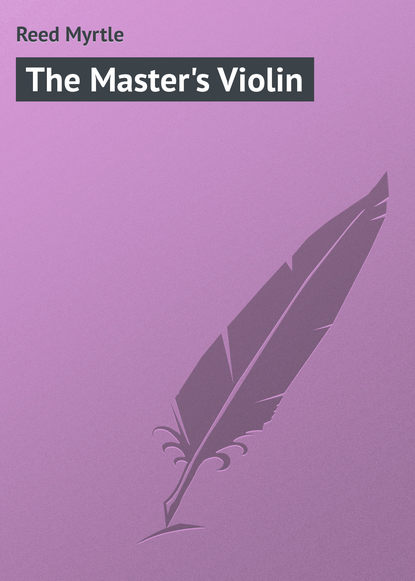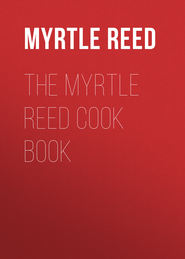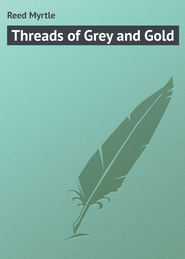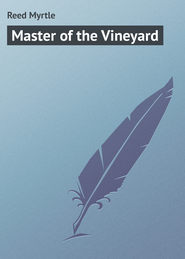По всем вопросам обращайтесь на: info@litportal.ru
(©) 2003-2024.
✖
The Master's Violin
Автор
Год написания книги
2017
Настройки чтения
Размер шрифта
Высота строк
Поля
“That’s what I thought,” said Lynn, as they went downstairs. “She was very old, you know – more than seventy-five. There is a great deal of fuss made about such things.”
Again the Master looked at him sharply, but Lynn was unconscious and perfectly sincere. He was not touched at all.
“You can have one of mine violins,” the Master resumed, “and I shall finish the one upon which I am at work. The concerto, please.”
At once Lynn began, walking back and forth restlessly as he played. He had long since memorised the composition, and when he finished the first movement he paused to tighten a string.
“You,” said the Master, – “you have studied composition?”
“Only a little.”
“You feel no gift in that line?”
“No, not at all.”
“It is only to play?”
“Yes, for the present.”
“Then,” said the Master, changing the position of the bridge on the violin in his hand, “if you have no talents for composition, why do you not let the composer of your concerto have his own way? You should not correct him – it is most impolite.”
“What – what do you mean?” stammered Lynn.
“Nothing,” said the Master, “only, if you have no gifts, you should play G sharp where it is written, instead of G natural. It is not what one might call an improvement in the concerto.”
Lynn flushed, and began to play the movement over again, but before he reached the bar in question he had forgotten. When he came to it he played G natural again, and instantly perceived his mistake.
The Master laughed. “Genius,” he said, “must have its own way. It is not to be held down by the written score. It must make changes, flourishes, improvements. It is one pity that the composer cannot know.”
“I forgot,” temporised Lynn.
“So? Then why not take up the parlour organ? You should have an instrument on which the notes are all made. I should not advise the banjo, or even the concertina. The organ that turns by the handle would be better yet. To make the notes – that is most difficult, is it not so? Now, then, the adagio. Let us see how much you can better that.”
Lynn played it correctly, and with intelligence, but without feeling.
“One moment,” said the Master. “There is something I do not understand. That adagio is one of the most beautiful things ever written. It is full of one heartache and has in it many tears. Your aunt, you say, lies dead in your house, and yet you play it like one machine. I cannot see! Perhaps you had quarrelled?”
“No,” returned Lynn, in astonishment, “I was very, very fond of her.”
There was a long silence, then the Master sighed. “The thing means more than the person,” he said. “Whoever is dead, if it is only one little bird, it should make you feel sad. But it waits. Before you have finished, the world will do one of three things to you. It will make your heart very soft, very hard, or else break it, so. No one escapes.”
“By the way,” began Lynn, eager to change the subject, “Doctor Brinkerhoff told me to ask you to come and play at the funeral to-morrow at four o’clock. He said it was his wish.”
The Master’s face was troubled. “Once,” he said, “I promised one very angry lady that I would not go in that house again, and I have kept mine word. It was only once I went, but that was too much. Still, it was twenty-five years and more past, and she has long since been dead. Death frees one from a promise, is it not so?”
“Of course,” replied Lynn, vaguely.
“At any rate, mine friend, the Herr Doctor, has asked it, even after he has known of mine promise, and, of a surety, he is wiser than I. I will come, at four, with mine violin.”
Lynn took the long way home, his sunny nature deeply disturbed. “What is it?” he vainly asked of himself. “Am I different from everybody else? They all seem to know something that I do not.”
Iris kept her long vigil by Aunt Peace, her grief too great for her starved body to withstand. At the sound of a fall, Doctor Brinkerhoff left his post and hurried upstairs. Margaret was there almost as soon as he was. Iris had fainted.
Together, they carried her into her own room, where at length she revived. “What happened?” she asked, weakly. “Did I fall?”
“Hush, dear,” said Margaret. “Lie still. I’m coming to sit with you after a while.”
She went out into the hall to speak to the Doctor, but he was not there. By instinct, she knew where to find him, and went into the front room.
He stood with his back to the door, looking down upon that marble face. Margaret was beside him, before he knew of her presence, and when he turned, for once off his guard, she read his secret.
“She never knew,” he said, briefly, as though in explanation. “I never dared to tell her. Sometimes I think the lines we draw are false ones – that God knows best.”
“Yes,” replied Margaret, unsteadily, “the lines are false, but it is always too late when we find it out.”
“Yet a part of the barrier was of His own making. She was infinitely above me. I should have been her slave; I was never meant to be her equal. Still, the thirsty heart will aspire to the waters beyond its reach.”
“She knows now,” said Margaret.
“Yes, she knows now, and she pardons me for my presumption. I can read it in her face as I stand here.”
Margaret choked back a sob. “Come away,” she said, with her hand upon his arm, “come away until to-morrow.”
“Until to-morrow,” he repeated, softly. He closed the door quietly, as though he feared the sound might break her sleep.
Iris was resting, and Margaret tiptoed down into the parlour, where the Doctor sat with his grey head bowed upon his hands. “She knows it now,” he said again, “and she forgives me. I can feel it in my heart.”
“If she had known it before,” said Margaret, “things would have been different,” but she knew that what she said was untrue.
“No,” he returned, shaking his head, “the line was there. You would not know what it is like unless there had been a line between you and the one you loved.”
“There was,” she answered, hoarsely, then her eyes met his.
“You, too?” he asked, unbelieving, but she could not speak. She only bowed her head in assent. Then his hand grasped hers in full understanding. The false line divided them, also, but in one thing, at least, they were kindred.
“I wish,” said the Doctor, after a little, “that we could hide her away before to-morrow. The people she has held herself apart from all her life will come and look at her now that she is helpless.”
“That is the irony of it,” returned Margaret. “I have even prayed to outlive those I hated, so that they could not come and look at me when I was dead.”
“Have you outlived them?”
“Yes,” answered Margaret, thickly, “every one.”
“You hated someone who drew the false line?”
“Yes.”
“And that person is dead?”
Again the Master looked at him sharply, but Lynn was unconscious and perfectly sincere. He was not touched at all.
“You can have one of mine violins,” the Master resumed, “and I shall finish the one upon which I am at work. The concerto, please.”
At once Lynn began, walking back and forth restlessly as he played. He had long since memorised the composition, and when he finished the first movement he paused to tighten a string.
“You,” said the Master, – “you have studied composition?”
“Only a little.”
“You feel no gift in that line?”
“No, not at all.”
“It is only to play?”
“Yes, for the present.”
“Then,” said the Master, changing the position of the bridge on the violin in his hand, “if you have no talents for composition, why do you not let the composer of your concerto have his own way? You should not correct him – it is most impolite.”
“What – what do you mean?” stammered Lynn.
“Nothing,” said the Master, “only, if you have no gifts, you should play G sharp where it is written, instead of G natural. It is not what one might call an improvement in the concerto.”
Lynn flushed, and began to play the movement over again, but before he reached the bar in question he had forgotten. When he came to it he played G natural again, and instantly perceived his mistake.
The Master laughed. “Genius,” he said, “must have its own way. It is not to be held down by the written score. It must make changes, flourishes, improvements. It is one pity that the composer cannot know.”
“I forgot,” temporised Lynn.
“So? Then why not take up the parlour organ? You should have an instrument on which the notes are all made. I should not advise the banjo, or even the concertina. The organ that turns by the handle would be better yet. To make the notes – that is most difficult, is it not so? Now, then, the adagio. Let us see how much you can better that.”
Lynn played it correctly, and with intelligence, but without feeling.
“One moment,” said the Master. “There is something I do not understand. That adagio is one of the most beautiful things ever written. It is full of one heartache and has in it many tears. Your aunt, you say, lies dead in your house, and yet you play it like one machine. I cannot see! Perhaps you had quarrelled?”
“No,” returned Lynn, in astonishment, “I was very, very fond of her.”
There was a long silence, then the Master sighed. “The thing means more than the person,” he said. “Whoever is dead, if it is only one little bird, it should make you feel sad. But it waits. Before you have finished, the world will do one of three things to you. It will make your heart very soft, very hard, or else break it, so. No one escapes.”
“By the way,” began Lynn, eager to change the subject, “Doctor Brinkerhoff told me to ask you to come and play at the funeral to-morrow at four o’clock. He said it was his wish.”
The Master’s face was troubled. “Once,” he said, “I promised one very angry lady that I would not go in that house again, and I have kept mine word. It was only once I went, but that was too much. Still, it was twenty-five years and more past, and she has long since been dead. Death frees one from a promise, is it not so?”
“Of course,” replied Lynn, vaguely.
“At any rate, mine friend, the Herr Doctor, has asked it, even after he has known of mine promise, and, of a surety, he is wiser than I. I will come, at four, with mine violin.”
Lynn took the long way home, his sunny nature deeply disturbed. “What is it?” he vainly asked of himself. “Am I different from everybody else? They all seem to know something that I do not.”
Iris kept her long vigil by Aunt Peace, her grief too great for her starved body to withstand. At the sound of a fall, Doctor Brinkerhoff left his post and hurried upstairs. Margaret was there almost as soon as he was. Iris had fainted.
Together, they carried her into her own room, where at length she revived. “What happened?” she asked, weakly. “Did I fall?”
“Hush, dear,” said Margaret. “Lie still. I’m coming to sit with you after a while.”
She went out into the hall to speak to the Doctor, but he was not there. By instinct, she knew where to find him, and went into the front room.
He stood with his back to the door, looking down upon that marble face. Margaret was beside him, before he knew of her presence, and when he turned, for once off his guard, she read his secret.
“She never knew,” he said, briefly, as though in explanation. “I never dared to tell her. Sometimes I think the lines we draw are false ones – that God knows best.”
“Yes,” replied Margaret, unsteadily, “the lines are false, but it is always too late when we find it out.”
“Yet a part of the barrier was of His own making. She was infinitely above me. I should have been her slave; I was never meant to be her equal. Still, the thirsty heart will aspire to the waters beyond its reach.”
“She knows now,” said Margaret.
“Yes, she knows now, and she pardons me for my presumption. I can read it in her face as I stand here.”
Margaret choked back a sob. “Come away,” she said, with her hand upon his arm, “come away until to-morrow.”
“Until to-morrow,” he repeated, softly. He closed the door quietly, as though he feared the sound might break her sleep.
Iris was resting, and Margaret tiptoed down into the parlour, where the Doctor sat with his grey head bowed upon his hands. “She knows it now,” he said again, “and she forgives me. I can feel it in my heart.”
“If she had known it before,” said Margaret, “things would have been different,” but she knew that what she said was untrue.
“No,” he returned, shaking his head, “the line was there. You would not know what it is like unless there had been a line between you and the one you loved.”
“There was,” she answered, hoarsely, then her eyes met his.
“You, too?” he asked, unbelieving, but she could not speak. She only bowed her head in assent. Then his hand grasped hers in full understanding. The false line divided them, also, but in one thing, at least, they were kindred.
“I wish,” said the Doctor, after a little, “that we could hide her away before to-morrow. The people she has held herself apart from all her life will come and look at her now that she is helpless.”
“That is the irony of it,” returned Margaret. “I have even prayed to outlive those I hated, so that they could not come and look at me when I was dead.”
“Have you outlived them?”
“Yes,” answered Margaret, thickly, “every one.”
“You hated someone who drew the false line?”
“Yes.”
“And that person is dead?”











